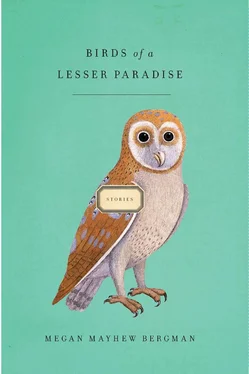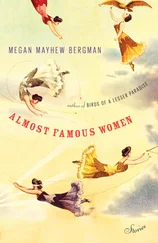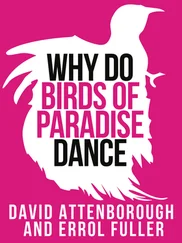Mom ran her fingers over Ike’s cowlick. I emptied the trash can in the kitchen, then the living room.
While you’re at it, she said, would you change the newspaper in Carnie’s cage? And top off his water?
As I approached the bird’s cage, he let out a piercing scream, his black beak open. I held my hand up as if to say “stop.” Cut the screaming, I said.
Put your hand down, Mom said. You’re scaring him.
Carnie continued to scream. It was a pleading, horrifying sound, like an alarm. He cocked his head and danced across his bar, shrieking. Ike began to cry.
Never mind, Mom said. I’ll do it.
She thrust Ike in my arms and marched toward the cage. She opened the door and Carnie scampered onto her finger. She brought him to her shoulder. He was silent. Mom pulled the newsprint from the bottom of his cage with bare hands. Dried bird shit fell to the carpet; she didn’t seem to notice.
Let me help you, I said. Sit down. I can do this.
Sit down, Carnie said. Sit down. Sit down.
Mom ignored me and walked to the kitchen, stuffing the soiled papers into the trash can.
You should wash your hands, I said.
Don’t tell me what to do, she said.
Sit down, Carnie said. Sit down.
I found Carnie’s high-volume pleas disconcerting and worried they agitated Ike, who clung to my shoulder. There were things, once, that I thought I deserved. My parents’ money, and certainly their unconditional love. But as years passed, our love had turned into a bartering system, a list of complicated IOUs.
I’m sorry, I said. I don’t know about birds.
You’ll learn, Mom said. Soon.
Ike and I arrive in Myrtle Beach at eight p.m. I know the zoo will be closed at this hour, so we find a Days Inn. There’s something about the hum of an ice machine and waterlogged Astroturf that takes me back to childhood.
Ike face-plants onto the bed before I can remove the comforter.
Wait a second, baby, I say. Let me get that dirty thing off.
We get in bed and flip through channels on TV. Ike holds the fabric of my pajama legs with one hand, wraps the other around a blanket my mother crocheted for me when I was in college. His travel blanket. I feel sad every time I see it: the coral and black starbursts, the tight knots. I remember a hotel I stayed in with my mother during her own mother’s funeral. Downtown Norfolk, 1986. There was a rotating bucket of chicken on a sign pole below our window. I watched it spin. Even when the lights were off, and my mother cried into her pillow, I watched that bucket of chicken rotate like the world itself.
I remember thinking that moms were not allowed to be sad, that surely women grew out of sadness by the time they had children.
Mom, Ike says. I don’t want to move.
His eyes flicker and he fades. The news is on. A lipstick-shellacked anchor tells of a new breed of aggressive python in southern Florida that strangled a toddler in his sleep. Maybe one will come to our hotel, I think. I will have to fight it off with my pocketknife, club it with the glass lamp on the bedside table, offer it my own body.
On our second date, Ike’s father showed me a video of an infant in Andhra Pradesh. The child had rich brown skin and curious eyes. He pulled himself across a grass mat while a cobra, hood spread, hovered above the boy’s soft body. The baby grabbed after the cobra’s tail while the toothless snake struck him repeatedly on his downy head, snapping down upon his body like a whip.
This, Ike’s father said, is how you cultivate the absence of fear. Don’t you wish someone had given you that gift?
Fear keeps me safe, I said.
Snakes. Why do I think of these things before I try to fall asleep?
I put one arm across Ike’s chest so that I will know if he moves. I can feel the pattern of his breath, the calm and easy way he sleeps, the simple way he dreams.
When I move out, Mom had said, I need you to take Carnie.
It was the hundredth time she’d asked. We had her bills and bank statements spread out on the coffee table. Her eyesight was failing and we knew she couldn’t live alone much longer. It was time to plan.
Carnie hung upside down in his cage. Empty seed casings and shredded newspaper littered the floor. Occasionally he pecked at his image in a foil mirror, rang a bell with his beak.
I don’t want the bird, I said. He hates me. He’s drawn blood, for Christ’s sake.
If you loved me, Mom said, you’d take him. I can’t sleep without knowing he’s safe and taken care of.
That’s what you get, I said, for adopting a bird with a life expectancy longer than your own.
You know, she said. Then she stopped, as if she was afraid of what she’d say next.
I’d always felt Mom’s vision of perfection was outdated. I was never the ruddy-faced, pure-of-heart Girl Scout with 4-H-approved sheep-grooming skills that she’d been. I failed home ec and took a liking to underground hip-hop and traveling jam bands, dyed my hair blue with Kool-Aid one high school summer. In college I got a tattoo of a purple Grateful Dead bear on the back of my neck that had infuriated Mom when she saw it. When Ike was little, he used to lift my hair to find the purple bear hiding underneath. At least someone liked it.
In Mom’s eyes, atonement was more than walking the line, more than surfacing from the typical angst-ridden throes of adolescence and early scholastic failures. Atonement included my adoption of a bird I couldn’t trust around my son. A bird I’d hated for over a decade.
I don’t trust the bird around Ike, and I can’t handle the mess, the noise—
Mom was silent. I’ll give Carnie to the plumber, Mom said, collecting herself. He’s always liked Carnie. He mentioned he was looking for a bird for his kids.
I wish I could take him, I said.
Lying doesn’t help, Mom said.
Even before I see it, Ted’s Roadside Zoo depresses me. We park outside. The entrance is a plaster lion’s face. We walk through its mouth. On the lion’s right canine, someone has written: Jenny is a midget whore.
This place smells like pee, Ike says.
It’s nine a.m., but it feels like Ted’s place isn’t open. I’ve yet to see an employee, not even a ticket seller. We walk a sand and gravel path, faux palm trees overhead.
I’ve heard stories about these places, how they keep big cats in small enclosures. How the animals often have ingrown nails and zero percent body fat.
I have the urge to call out, Mom? as if I’m coming home after a long day.
We find a man feeding a seal.
Where are your birds? I ask. Specifically, your African gray? We have two, he says. Over by the vending machines.
I need the one named Carnie, I say. The one you received from the Red Oak Bird Sanctuary.
I think it’s the one on the left, he says. They all look alike, you know?
Ike and I find the birds. I can’t help but feel guilty that Carnie ended up in a place like this. There’s gum stuck to the bars of his cage.
I home in on Carnie’s knowing eye, the white mask. He looked like the same bird, though his gray feathers had worn thin around his neck.
Carnie, I say. Carnie. Carnie. Good boy. What do you want for dinner?
I pull out a pack of sunflower seeds I purchased at the Zip Mart down the road.
I look at the white down on the bird’s chest and think: Mom’s voice is in there .
Ike closes in on the cage. He waves his hands in front of the parrot’s face.
The sign on Carnie’s cage reads: African gray parrots are as smart as a three-year-old.
I don’t believe it, Ike says.
Carnie? I ask. Want to sing some Patsy?
For a half hour, Ike and I coo and speak and dance, but the bird doesn’t say a word. Beneath this wall of gray feathers is the last shard of my mother’s voice, and I feel myself growing increasingly desperate. How thick was her accent? Was her singing voice as beautiful as I remember? She always spoke sweetly to Carnie and I wanted to hear that sugary tone, the one she hadn’t used with me in her last years.
Читать дальше












